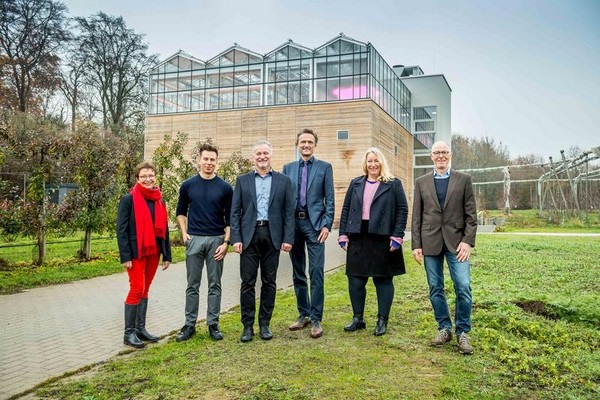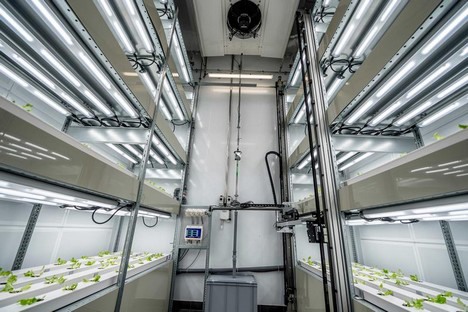Until now, vanilla has mostly come to us from regions around the Indian Ocean, and pepper has also been imported to Europe to this day. This is now set to change, as new, future-oriented, and sustainable cultivation options for these and many other herb and vegetable plants are now being researched at the "Indoorfarm - Agricultural Systems of the Future" research center at the Osnabrück University of Applied Sciences' campus.
Professor Dr. Andres Bertram, President of the Osnabrück University of Applied Sciences, emphasized the importance of the new building at the opening ceremony: "It is a showcase project because, on the one hand, we are investigating important questions for our society and the world for tomorrow. On the other hand, the way we do it is also exemplary for our teaching and research mission: lecturers and students work closely with practical experience to generate ideas from it. This illustrates our added value as a university of applied sciences."

Sebastian Deck, Andreas Ulbrich, and Andreas Bertram are looking out for other participants.
Professor Dr. Andreas Ulbrich, Professor of Vegetable Production and Processing at the Osnabrück University of Applied Sciences, is largely responsible for the fact that the indoor farm is now located at the Faculty of Agricultural Sciences and Landscape Architecture at the Osnabrück University of Applied Sciences. He developed the idea for the building about six years ago with his research assistant Sebastian Deck and the team from the "Growing Knowledge" research group.
"It fills me with pride that we are officially inaugurating the building today. Our driving force has always been to put the plants themselves at center stage. That means we want to generate absolutely ideal conditions for the growth of the plants. This distinguishes us from many other approaches that have positioned themselves worldwide." Together with his team, Ulbrich will work at the indoor farm to develop new, climate-independent cultivation methods for vegetable production in urban areas, i.e., on a small area. Students will also be involved.

A sensor system travels over the different shelf levels of the growing chamber to analyze the growth of the lettuce plants. This way, light and nutrient requirements can be optimally adjusted.
Six indoor chambers and a rooftop greenhouse allow for season-independent cultivation
On the first floor of the new research center, there are six separate indoor chambers in which the cultivation of different vegetable and spice plants is researched. The individual chambers are designed to allow efficient use of space at height (so-called vertical farming). Furthermore, all necessary environmental factors such as light, temperature, CO2 content, water, and nutrients can be precisely controlled and managed. This leads to reliable, weather-independent product quality. It also makes it possible to research how much light and how many nutrients are needed for the optimal cultivation of each plant.
On the roof of the research center is a 160-square-meter rooftop greenhouse, where research is also being conducted into various cultivated species - including vanilla and pepper plants that have already grown several meters high. One special feature: "You can see blossoms on a pepper plant, blossoms with further developed peppercorns and ears that are ready for harvesting; it would be very rare to see all this simultaneously in their original source countries," Ulbrich states. However, the aim is not only to grow exotic plants but also to pass on the new knowledge to the growing countries. Pepper and vanilla are also just the beginning of many other crops that will be grown here in the future - including sweet potatoes, lettuce, and many other vegetable crops.
Efficient use of energy thanks to intelligent circulation system
The new research center is not only conducting research into the ideal growing conditions for a wide variety of vegetables. The research team led by Ulbrich and Deck is also looking at the issue of sustainable energy use in indoor farms. "The cube is equipped with an intelligent energy circulation system that connects the indoor farm's cultivation chambers with the glass greenhouse on the roof. For example, we want to use the energy from the LEDs in the ground-floor chambers to provide heat in the rooftop greenhouse," Deck said.
"For all the research projects, we will collaborate with colleagues from a wide variety of other departments at the university. In addition, some companies from the region are already involved, and many more have expressed interest," Ulbrich explains. The goal for everyone is to research how indoor farms can be used in urban areas in the future and thus secure tomorrow's food supply independently of the climate.
Images: Aileen Rogge / Osnabrück University of Applied Sciences
For more information:
Prof. Dr. Andreas Ulbrich
Professor für Gemüseproduktion und -verarbeitung
Tel.: 0541 969- 5116
[email protected]
www.hs-osnabrueck.de
